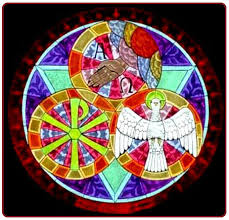
One of the most painful ministries for a Priest is when a child dies.
What to say?
I am in the family living room surrounded by photos of the dead child, smiling, laughing, dressed as a Princess beside Cinderella in Disney land, blowing out candles at her birthday party. The grieving parents are there, in shock. Neighbours and other family members are sitting, and coming and going.
A neighbour speaks, "Jesus wanted her as an angel. That’s right Father, isn’t it? She has gone to heaven, to be an angel with Jesus."

I look at the parents. Thankfully they are in such a shock I don’t think they register what is being said. If they did I fear they would rage at God.
What sort of a God would take away their beloved child because that God wanted her as an angel? Even if we assume that as an angel she might be in perpetual bliss, surely this is just sheer cruelty for the parents, so violently robbed of the living presence of their child.
The problem of suffering/evil is one of the strongest arguments for atheism. It undermines belief in an all powerful and all loving God. If there is suffering, either God is all powerful and allows it, in which case God is not all loving, or God is all loving but unable to prevent it, in which case God is not all powerful.
What does Christianity have to say about suffering?
Well, it turns out, quite a lot!
Christianity is unique among the major faiths in that its origin is in a tragedy. Christianity was born from the premature death of an innocent and good man, Jesus. A man who spoke of compassion and sought to break down barriers and create a new type of community where the most esteemed where those who best served others and lived generous, forgiving, life-changing lives.
The first question for Christianity was: Why did this man die? Its earliest narratives remember his last words of despair: “My God, my God, why have you forsaken me?” The opening words of a Hebrew Psalm that begins with a cry of despair but ends with praise of God.

The uniqueness of the Christian faith is that it elevates this experience of forsakenness by God into the heart of God itself. This is the inspiration for the Christian doctrine of the Trinity.
It may look as if the Trinity is an outrageous piece of Greek philosophical & theological religious speculation. The Father, Son and Holy Spirit are described as three ‘persons’ (hypostases) in one ‘substance’ (essence/nature). Christ is understood to be one person with two natures. Within the Trinity each ‘person’ is fully God , yet there is only one God! It makes no sense from a rational point of view. And the early church classical theologians all warned against trying o comprehend it. If one thought one had understood the doctrine of the Trinity this was a clear indication that one had not!

The Trinity was not a scientific statement of the cosmic order. It was a tool for contemplation, prayer, worship and Christian living.
But crucially it is important to remember where it comes from. Not from a willfulness to create incomprehensible religious nonsense, but from deep reflection on the life and death of Jesus.
The Trinity was inspired by one consistent overriding belief: that all that happened to Jesus was totally in keeping with the will, purpose and nature of God. This means that God is deeply embedded not just within the cosmos but also within human existence. It means too that there is no separation between the sacred and the universe as we experience and understand it. God is one, and that oneness is absolute, embracing all that is. And most importantly for Christian contemplation, is most intimately perceived in the life of Jesus, which includes his death.

So I return to my living room encounter with the grieving parents of a child who has tragically died. What does Christianity have to say to those parents?
Well, three pastoral things.
That God is present within the pain, messiness, and misery. (Just as God was present in Jesus death)
That God is present in our response to the tragedy. (Just as the Holy Spirit inspires us to acts of loving compassion)
That God can bring healing. (Just as God the Father raised Jesus)
That is a Trinitarian response to the problem of pain. The three reference points of the Trinity meet the three pastoral points because the Trinity is above all a response to the original pastoral situation of the first followers of Jesus: How can we continue to follow Jesus now that he has been so cruelly and unfairly executed. Christianity is first and foremost a pastoral religion.
We follow the good shepherd. We strive to imitate his attitude and his action.
The God-stuff follows out of that.